The Elizabethan

From the Headmaster
Dear Parents,
The announcement earlier this month that Queen Elizabeth’s School was the Sunday Times Schools Guide State Secondary School for A-levels 2025 was welcome independent confirmation that the performance of this summer’s leavers at A-level really was superb. This performance was especially marked at the highest grades. A remarkable 52.9% of A-levels taken in 2024 at QE were at A*.There was consistency, too: the proportion of grades at A*–B remained above
95% for the 19th consecutive year. These results saw our newest OEs secure quite phenomenal destinations – half going to universities ranked in the World Top 10. No less impressive were the GCSE results. Multiple records were broken, with, over two-thirds of examinations taken awarded the highest grade 9 and 87% at grades 8-9. This excellence, too, was reflected by the Sunday Times: QE came a very close second among state schools in the overall Parent Power rankings for academic performance (just behind Henrietta Barnett) based on both A-level and GCSE results.
I congratulate our pupils on their achievement. My colleagues and I celebrate with the boys and with their families, without whose support such results would not be possible. That parental support for the School was evident in the response to the recent parents’ survey. RSAcademics, the education specialists whom we commissioned to conduct it, tell us that the level of engagement was exceptionally high. Thank you for your commitment; I thank, too, our pupils for their own high level of participation in our separate students’ survey.

READY FOR ACTION: Year 10 had fun and tested themselves on a trip to Wales. See p10.
I look forward to sharing feedback from the survey early next term and to using it with colleagues and Governors to inform priorities in our new School Plan. Work is well under way on this, and we are on track to draw up a new set of strategic priorities to be applied from September 2025 to cover the next five years.
“Exceptionally high parental engagement”
Significant progress continues to be made in many areas, not least in the ongoing advancement of our digital strategy, with the 1:1 programme now covering all those in Years 7-10, as showcased in the latest video made by Microsoft
A great deal of work has been done this term under our new estates strategy as we get ready to submit a pre-planning application for our future sports hall. While we move forward with the very earliest stages of that long-term project, and with our plans to eventually create a Fern Café, we celebrate the recent installation of carefully selected audio-visual equipment in The Robert Dudley Studio. As you can read in this edition, this is already helping us realise the studio’s exciting potential as a flexible venue for drama, dance and the spoken word.
While the completion of the studio represents the final piece of the jigsaw that was our previous estates strategy, the announcement at the start of this term of our plans to open three affiliate schools in India and the United Arab Emirates signals the start of an exciting new chapter in the QE story. This term has seen considerable activity by our
partners, GEDU Global Education, supported by senior staff here; there has been progress, especially, with the vital task of appointing the founding headteachers of the three QE Global schools. I must acknowledge the extremely positive feedback from parents on this strategic move, designed to support education here at QE Barnet long into the future. QE, of course, has a vital role to play in this venture as we shape and guide the fee-paying schools overseas that will soon carry our illustrious name. At the same time, GEDU, which already works with 60,000 students worldwide, will be bringing to bear its wide experience and considerable resources on all the tasks involved in getting these schools up and running. Rest assured that my colleagues and I will remain acutely focused on maintaining the high standards for which our School is renowned.
The summer holidays and Autumn Term have seen our boys enjoying great success in national and international competition, both individually and in teams. A QE team first won in Europe in the continental round of the World Economics Cup and then went on to record a top-ten finish in the international finals. Two members of that team also took seventh place in the World Climate Science Olympiad – a competition of 37,000 entries. In the Ritangle Mathematics competition, we not only won for the second

consecutive year, but second place went to the QE team who were last year’s winners. Similarly, in the regional round of the popular Top of the Bench Chemistry competition, QE came first and second.
“ Shaping QE Global Schools”
As that winning team of young chemists heads off for the competition’s national finals in the spring, they can be inspired by the towering achievement of Old Elizabethan Sir Demis Hassabis (1988–1990) (pictured above), who has won the Nobel prize for Chemistry. The award was won jointly with Dr John Jumper, Demis’s colleague at DeepMind, the company he co-founded in 2010 with fellow OE Mustafa Suleyman (1995–2002) and a university friend. It was awarded for their work on predicting complex protein structures. To the best of our knowledge, Demis is the first alumnus of this School ever to win a Nobel prize. Furthermore, the Nobel committee were fulsome in their praise for his work, describing it as a “stunning breakthrough” that was of “the greatest benefit to humankind”. Demis’s work is, then, a shining example of our commitment to producing responsible Elizabethans who seek, as our current School Plan, Building on Distinction, has it, “to change things for the better, both in [their] own community and in society at large”.
In this traditional season of goodwill to all, I wish all QE families a happy and restful holiday.
Neil Enright Headmaster


QE on the world stage
Following the announcement of the launch of QE Global Schools at the start of term, plans to open fee-paying schools overseas under the QE banner have continued apace.
Working with a widely experienced partner, Global Education (GEDU), QE intends initially to establish two schools in India (in GIFT City, Gujarat, and Gurugram, near Delhi) and one in the UAE.
GEDU’s Chief Executive Officer, Dr Vishwajeet Rana, and Deputy CEO, Professor Ray Lloyd, visited QE in September. Then at half-term, the Headmaster flew to the UAE and India,


meeting dignitaries and education officials during a visit that coincided with Diwali.
Once established, the new schools will supplement other sources of income for QE Barnet to ensure that it can continue to offer a state school education second to none. The commercial relationship with GEDU will be managed by FQE International Enterprises Ltd, a newly created subsidiary of FQE.
Winter wonder
QE musicians heralded the start of winter in style with a concert featuring almost a third of the pupil roll.
The Shearly Hall was packed with parents, as 14 different ensembles entertained in a programme drawn mainly from the lighter side of the repertoire, including film music and rock & pop.
Pupil leadership was a feature, with eight pupil conductors taking centre-stage.

Path to greatness
QE Futures supported 2024’s leavers in winning places at the world’s best universities and is now breaking records as it helps the current Year 13 find their own golden path. Fiftyfour of the cohort – QE’s largest ever – are taking up places at Oxford or Cambridge, while 55% of them received offers from a university in the QS World Top 5, which includes Imperial as well as Oxbridge. This month and last, a record 90 OEs and other QE supporters conducted more than 150 individual online mock interviews. The OEs included doctors and entrepreneurs Kavi Samra and Paul Jung (both 2008–2015), who held interviews for all 33 medical applicants.

Exploring big ideas
An extremely popular QE Futures trip to Oxford afforded 41 Year 10 pupils a taste of university life, including a tutorial-style lecture. The trip took in Jesus College and Christ Church.
Reflecting on an “inspiring day”, pupil Nirvana Gandhi-Mehta said: “The real highlight for me was an extraordinary lecture by Matt Williams, an Access Fellow at Jesus College. He wove together ideas about the human condition, the stories we tell and the laws of the universe.”
Educating Elizabethans for a digital age
How QE uses technology to boost teaching and learning
QE is committed to equipping its pupils with the digital skills they need, while also making the best use of technology to support teaching and learning across the whole curriculum.
Whether in French or in Physics, in Art or in History, technology is opening up new possibilities for pupils. While other equipment plays its part – the PE department, for example, has invested in hardware and software to support sports as diverse as orienteering and cricket – the 1:1 Programme is very much at the heart of QE’s digital strategy. The programme now covers all of Years 7-10, as showcased in the latest video from Microsoft. Digital literacy is thus being achieved across all subjects in these year groups.
Head
of Digital Teaching and Learning
Michael Noonan said: “While we've started with substitution and augmentation (from the SAMR model), there have already been some changes that Heads of Subject describe as transformational (see the video!). The programme is encouraging staff to try new approaches, with, for example, Maths teachers trialling a resource requiring student-led discovery learning.”
There has been a focus on examining

how the technology can support differentiation in the classroom –supporting pupils with their individual needs and helping them progress at their pace. “While the amount of digital learning has increased significantly, we are also cautious to ensure that devices do not detract from other key aspects of good teaching and learning: it is important, for example, to have lots of discussion and dialogue in the classroom,” Mr Noonan said.
Away from lessons, the School is making adaptations to the pastoral
curriculum (Personal Development Time) to ensure boys are equipped to use it appropriately, understanding the risks as well as the opportunities it presents them. This is part of a wider PDT review to ensure the curriculum is preparing boys well for the challenges and opportunities of the modern world. And thanks to the arrivalof 1:1 devices and QE’s purchase of the Smoothwall Pulse service, a weekly wellbeing check now provides an insight into pupils' individual and collective happiness, and provides a discreet way for pupils to ask for help if they need it.
QE FLOURISH AND DIGITAL SKILLS
A wealth of clubs, activities and competitions give boys exciting opportunities to develop important digital skills, including coding. Here is a selection of this term’s highlights.

UK BEBRAS CHALLENGE: GOLDEN START
As first-time participants, QE enjoyed extraordinary success in this event, which aims to introduce computational thinking through interactive tasks that encourage logic and problemsolving. Twelve boys from Years 8 & 9 achieved perfect scores, a further 19 won a distinction, and a total of 73 were awarded gold. The photo shows the gold award-winners, who all qualify for The Coding Challenge, to be sat at the School on 24 March 2025 (QE’s 452nd anniversary).
Participants in The Coding Challenge choose between five skill-based categories, two using the Turtle Blockly programming language, and three that require a text-based language.
BRITISH INFORMATICS OLYMPIAD
Twenty-five sixth-formers await the results of the BIO first round sat earlier this month. BIO aims to encourage interest in information technology. The three-hour first round involves solving problems against the clock with only a pen, paper and computer.
BATTLE OF BARNET: VEX ROBOTICS
QE hosted the largest regional VIQRC (junior age group) competition, with 40 teams vying for eight prizes. They included the Alanya Robotik team, visiting from Türkiye’s Mediterranean coast. Branded the Battle of Barnet, the event featured decorations that gave a nod to the Wars of the Roses.
Three QE Year 9 teams each won a prize: team 21549C took the Excellence award; 21549A the Design award; and 21540B the Innovate award.

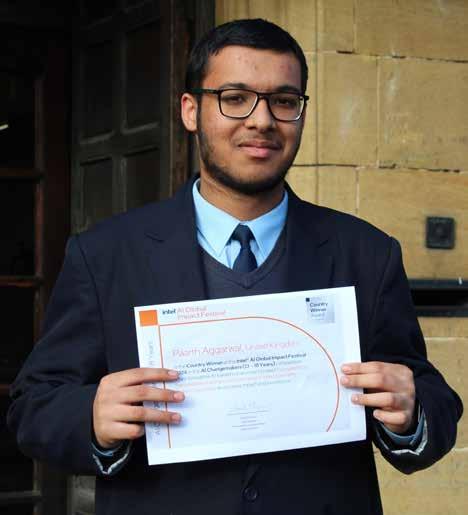
AI TO HELP CHILDREN WITH AUTISM
Year 11 pupil Paarth Aggarwal was the UK winner in the 13–18 age group in the global AI Changemakers competition run by technology giant Intel. He impressed judges with his multilingual GenAI-powered NavigateNinja app, which combines storytelling in a natural voice with animated video, offering personalised learning to children with autism and related conditions.
Paarth used Intel Core Ultra Processor for its strong graphics and fast rendering times for complex animations. He also deployed the OpenVINO toolkit running on Intel Dev Cloud to execute AI models at scale.


Speak for yourself! The importance of oracy
At Queen Elizabeth’s School, oracy, or the ability to express oneself clearly, fluently and accurately, is considered to be of the first importance.
No matter how impressive a student’s qualifications, how thoroughly he has mastered his chosen field, if he cannot speak well, he will likely fall short of achieving his ultimate potential in life. In almost any career, being able to speak confidently is an asset; in many, it is essential.
To this end, the School seeks to develop boys’ ability to talk well right from the start. Drama is remarkably effective in this regard. Acting builds confidence, of course, while actors soon realise the importance of tone and gesture. By engaging with the work of great playwrights, boys learn how to wax eloquent without being prolix; they see how to formulate an argument; and they are exposed to rich, crafted language and complex, nuanced issues.


The 2024 School Play, Lions and Tigers, plunged headlong into the decadeslong run-up to Indian independence in 1947. The Headmaster said: “The production did not shy away from the pain, violence and brutality of the period, but dealt with the complex issues sensitively and conveyed the emotional depth of the characters. It was impactful and, at times, shocking, yet done with a gravitas and maturity that belied the age of some of the young performers.”
Alongside drama, we naturally think of competitive debating (including competitions such as the Bar Mock Trial, preparations for which are underway), but speaking skills are fundamental to a range of diverse situations. Here, for example, are three of the Extended Project Qualification
presentations some of our Year 13s have undertaken this term:
• To what extent was the 2007 financial crisis the fault of mathematics? (Nikan Ahmadi)
• Is there room for improvement in the diagnosis and treatment of autism in the UK? (Kavinayan Manivannan)
• Which rocket propellant is the best for the first stage of orbital rockets? (Shreyas Mone).
Then there are the mock university interviews (not to mention the real thing!) and the rise of video. In the TEDx QE School event, pupils from QE and two from Queen Elizabeth's Girls’ School spoke on camera on a topic of their choice, with the aim of

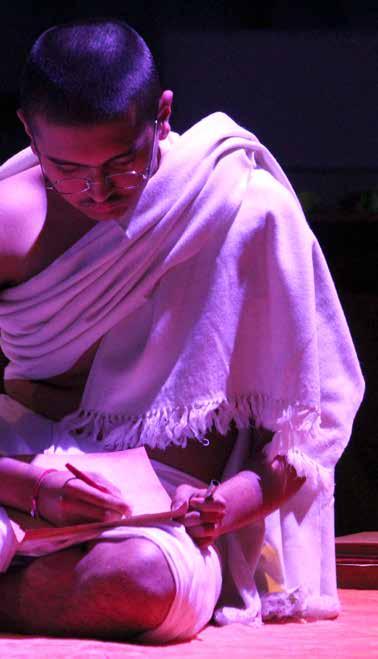



‘spreading ideas worth sharing’. And it was a video presentation that helped a QE team place second globally in the World Economics Cup (see p11).
As digital technology plays an increasing role, demonstrating understanding by being able to speak about a topic, or answer questions verbally, becomes no less important. Dialogue is also an easy and effective means of collaboration. Deputy Head Anne Macdonald (Academic) said: “We are intent on ideas being shared within classrooms and interrogated in lively but supportive academic discussion.”
One excellent example was this term’s academic symposium for QE Year 13 students with their counterparts from North London Collegiate
School. Grouped by the subject they seek to study at university, they held roundtable discussions, both boys and girls presenting topics and being asked questions. Such symposia encourage the sharing of ideas. They involve academic discussion with people whom participants may not already know. And they serve as useful preparation for university interviews and for seminar-style learning.
Oracy in the RDS
The Robert Dudley Studio was created as a facility for the spoken word. Here are some recent activities.
PERFORMING SHAKESPEARE:
Every boy in Year 8 learns a Shakespeare speech to perform in class. Head of English Robert Hyland explains why: "There are some things which reading Shakespeare simply as words on the page can never give – so much of the impact comes from how performers have chosen to interpret the text, following the rhythms and the imagery of the poetry to bring the words to life.” At the final in the RDS, Param Jani was adjudged the winner, with the Is this a dagger I see before me? speech from Macbeth. He and runner-up Sai Rushil Manchiraju will compete against other schools next term.
MACE DEBATING:
QE hosted the first round of the English Speaking Union competition. A senior home team – including Chanakya Seetharam, Zaki Mustafa, and Koustuv Bhowmick – won through to the next round.
ENGLISH LESSON:
This explored Shakespeare’s The Tempest, focusing on the language of the court’s amazement at natural phenomena, and on visual depictions of nature interacting with humanity.



From the archives: reconnecting over food (and, perhaps, wine)
With the exception of the war years from 1915–1917 and 1941–1945, and Covidaffected 2020, Old Elizabethans have been meeting annually to reconnect and dine in style since 1886.
It all started with a letter to the editor of The Elizabethan in March 1886 from alumnus S Huggins: “Sirs,There has long been felt, among a great number of ‘Old Boys’, an absence of opportunity for holding a social gathering, which should take place at least once a year. But now, Sirs, I have very great pleasure to be able to inform you that this want is, I think, at last overcome.”
This first OE dinner was held at Anderton’s Hotel, Fleet Street, on Monday 3rd May in 1886. Tickets were 12s 6d, inclusive of wine. It was, according to the The Elizabethan of July that year “a great success”, with 40 alumni attending.
Thereafter, various venues played host, including the House of Commons, The Shaftesbury Hotel in London and Tudor Hall (1980 and 1981). In 1982, it was held 'in the School Hall'; the School subsequently became the permanent venue.
Some elements of the early dinners remain familiar today – the

toast, taken in silence, to the ‘pious memory of Queen Elizabeth I’, for example. Others, such as the singing of the old School song, Queen Elizabeth sat one day, have passed away.
Towards the end of the 19th Century, concern was expressed that fewer people were attending, which was put down to the cost of wine, no longer included in the ticket price. This was addressed in The Elizabethan in 1894: “There seems to be an idea that those who attend must spend a good deal of money on wine…This is quite erroneous. Abstinence, whether prompted by

motives of economy or principle, is respected.’”
The early 20th Century saw some special dinners: in 1900, for veterans of the Second Boer War (pictured above right), and in 1918, to mark the end of the First World War.
Over the past century, the OE dinner has
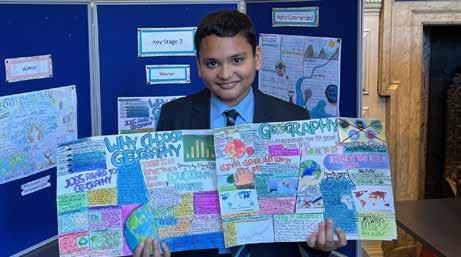
Sound man’s scholarship win Chosen as champion!
2024 leaver Indrajit Datta won a £30,000 Air Diversity Scholarship to support him through his three-year Tonmeister (Music & Sound Recording) course at the University of Surrey.
Year 7 pupil Aarav Kumar’s informationpacked poster on the theme of Choose Geography won first prize for his age group in a prestigious Royal Society of Geography competition.
remained a fixed point in Elizabethan life. This year’s event (pictured immediately above) may have been a less formal affair than, for example, the 1930 dinner at the Criterion Restaurant (top left), but, with numbers currently on the rise, the desire of alumni to reconnect over a good meal is as strong as ever.
Our man at the Foreign Office
Year 13’s Avi Juneja’s essay on developing nations’ debt came first in the Next Generation Essay Economics competition, run by the Foreign, Commonwealth and Development Office (FCDO) and London School of Economics and Political Science (LSE). Avi received his prize in the splendour of the Foreign Office building.

“Truly outstanding”
Sixth-formers Andreas Angelopolous and Saim Khan achieved seventh place out of 37,000 entries in the Climate Science Olympiad.
Andreas and Saim’s 3,000-word essay on the Kyrgyz Republic’s food system impressed judges in the competition, which was open to anyone aged to 25, including university students and even professionals working in the field. The announcement of the results was timed



to coincide with the COP29 conference in Azerbaijan. Deputy Head (Academic) Anne Macdonald said: “For two school-age students to have secured such success against significantly older entrants sets this apart as a truly outstanding achievement.”
Destination Dresden
Current School Captain Chanakya Seetharam made the most of his time in Germany after becoming a Dresden Scholar.
Nominated by QE for the prestigious scholarship offered by the Dresden Trust, he spent three weeks staying with a family and learning about the rich cultural history of the German city, destroyed by Allied bombing in February 1945.
An A-level German student, he enjoyed experiences ranging from a church service “full of lovely German choral music” to talking politics in the run-up to the Saxony state elections. “Without my German lessons at QE, I simply would not have been able to engage with another culture and build relationships in the way that I have.”

Parliamentary prowess
Just days after the US presidency had changed hands, A-level Politics students enjoyed the chance to learn more about democratic institutions on this side of the Atlantic. The 20 sixth-formers' visit to the Palace of Westminster took in both Houses of Parliament, the Central Lobby and Westminster Hall. They also impressed staff from the UK Parliament’s education department with their contributions to an interactive workshop on elections.

Climbing, kayaks and caves!
The youngest Elizabethans enjoyed the chance to make new friends when, just for a day, they got away from it all at an adventure park. The trip to Stubbers in Essex is designed to be fun, but also to stretch boys in their early weeks at QE, giving them the chance to bond with each other over shared challenges.


Phone-free fun in Aberdovey
Year 10 boys enjoyed outdoor activities and team-building on the Welsh coast. In a change from last year’s dual trips, all 95 participants made the coach journey together. There were also new activities – abseiling and making a fire –alongside canoeing, climbing, hiking and shimmying along a rope above water.
Flourish tutor Celia Wallace said: “The boys returned tired but exhilarated, with fresh skills learned, a few fears faced and overcome, new friendships forged, and existing friendships deepened.”
One boy, Aryan Afghan, applauded the decision to remove boys’ phones. “Many of us felt a lot happier and more awake without them, and some didn’t want to use them on the way back.”


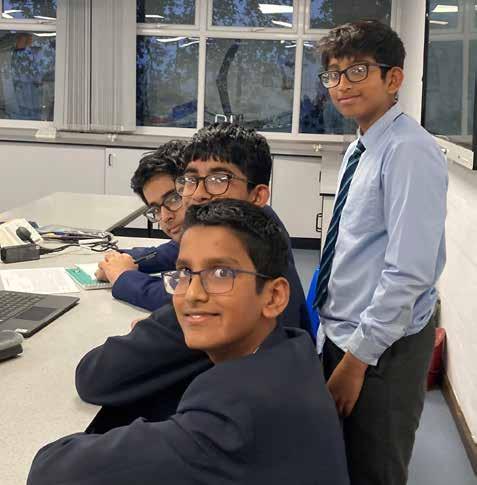
Vintage year in Chemistry competition
QE not only won the regional final of the Top of the Bench competition, but also took second place – in fact, all five of the School’s teams came in the top ten. These successes add further lustre to QE’s shining record in the Royal Society of Chemistry’s 20-year-old competition.
The winning team goes on to the national finals in the spring. It comprises: Aaditya Pimple and Varenya Pangaluri, of Year 9; Arhaan Yadav, of Year 10; and Yash Mehta, of Year 11.
Head of Chemistry Amy Irvine said: “QE demonstrated real strength
COP 29, AI, BHM: the big issues
This month’s Econobethan, QE’s student-run Economics and Politics journal, looks at the COP 29 climate change summit in Azerbaijan and explores AI in Economics. Black History Month was the subject of QE’s newest student publication, Bioquest, in October. Now published on eQE as a stand-alone publication, the Biology journal profiled the contribution of several Black scientists.
in depth, and it was a splendid performance by our winning team, who beat more than 50 others to take first place – in national Chemistry Week, too!”
This year’s regional finals, conducted over Zoom, featured six rounds.

We will remember them
QE took a creative approach to honouring its fallen in 2024, while also marking Armistice Day in traditional fashion. As well as the wreath-laying ceremony and two-minute silence, activities included more than 600 pupils and staff taking part in a Remembrance Day quiz.

More successes at World Economics Cup global finals
Having won the World Economics Cup’s European round, a QE team came second in the presentation round at the global finals, and ninth overall.
The international finals involved 100 multiple-choice questions, a lecture followed by further questions, and submitting a video presentation. The Year 13 team – Saim Khan, Rohan Varia, Uday Dash, Zaki Mustafa, Andreas Angelopoulos and Tejas Bansal – delivered their presentation on The Impact of Digital Nomadism on Local Economies.

A break in Berlin
Twenty senior linguists experienced the culture and history of Berlin on a halfterm trip. In a packed programme, the boys from Years 11-13 visited locations ranging from the Jewish Museum to the German Democratic Republic (DDR – East Germany) museum. Small groups gave presentations in German to their peers about the cultural highlights.
They were, in fact, one of two QE teams to qualify for the international finals, teams from the School having come first and second in the European round. The successful ‘cup run’ began when both teams won gold awards in the UK round. The Headmaster said: “Ninth overall, and second in that most prestigious of rounds – what a splendid achievement!”
Celebrating migration
Year 8 explored their own family histories during a visit by staff from London’s Migration Museum.
Ahead of morning workshops organised by the Geography department, the year group had been asked to interview family members on their own migration stories. During the visit, the boys used ArcGIS mapping tools on their 1:1 tablets, mapping all the journeys made by the people they had interviewed. There was a session for Year 11 historians in the afternoon.




Off to the regional finals
QE’s A team came first in the regional qualifier for next term’s regional knockout stages of the English Schools’ Chess Championships. Beating off competition from 17 other teams, the senior pupils of the A team emerged on top after winning four of their matches in the event at Harrow. The younger B team were fifth, and both A and B teams qualified for the next stage. Also this term, in-school tournaments pitting boys against others in their year groups have attracted large number of participants.
Shown here are some of the entries in a chess piece design competition in Art.
Champions – again!
QE has won the international Ritangle Mathematics competition for the second consecutive year.
The eight-strong winning team from Year 12, called Pioneers, were the first of some 1,700 teams to submit the right answer to a series of three crossnumber puzzles.
Furthermore, last year’s winning QE team, Flexangle, came second, while a further three QE teams reached the final shortlist of 16. All the QE teams are understood to have been in the top 200.

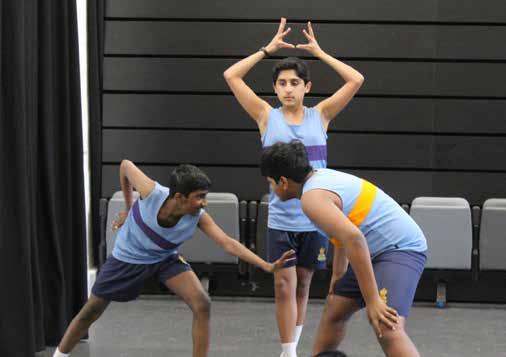

Watch, listen ...and dance!
The Robert Dudley Studio’s potential as a flexible venue was demonstrated in a new partnership with the English National Ballet.


First, 30 Year 9 boys saw a screening of the ENB’s award-winning production of the classical ballet, Giselle. Then, the boys toured the ENB’s design and rehearsal studios in Canning Town. Finally, ENB dancers and a musician came to QE and gave the boys a contemporary ballet workshop, testing The Robert Dudley Studio’s

new audio equipment to the full. Assistant Head (Pupil Involvement) Crispin Bonham-Carter said: “It was brilliant to see the studio being used as both a superb surround-sound cinema and then, with the seats retracted, a fantastic dance studio! Best of all was the enthusiasm and energy the boys put into their dancing.”
Big match lives up to its billing
The First XV and their Habs’ opponents served up an engrossing, hugely physical contest in the traditional season highlight. QE suffered a narrow 13–7 defeat, but Director of Sport Jonathan Hart said: “The match was finely balanced. Their performance deserved more – it was one to be proud of.”
